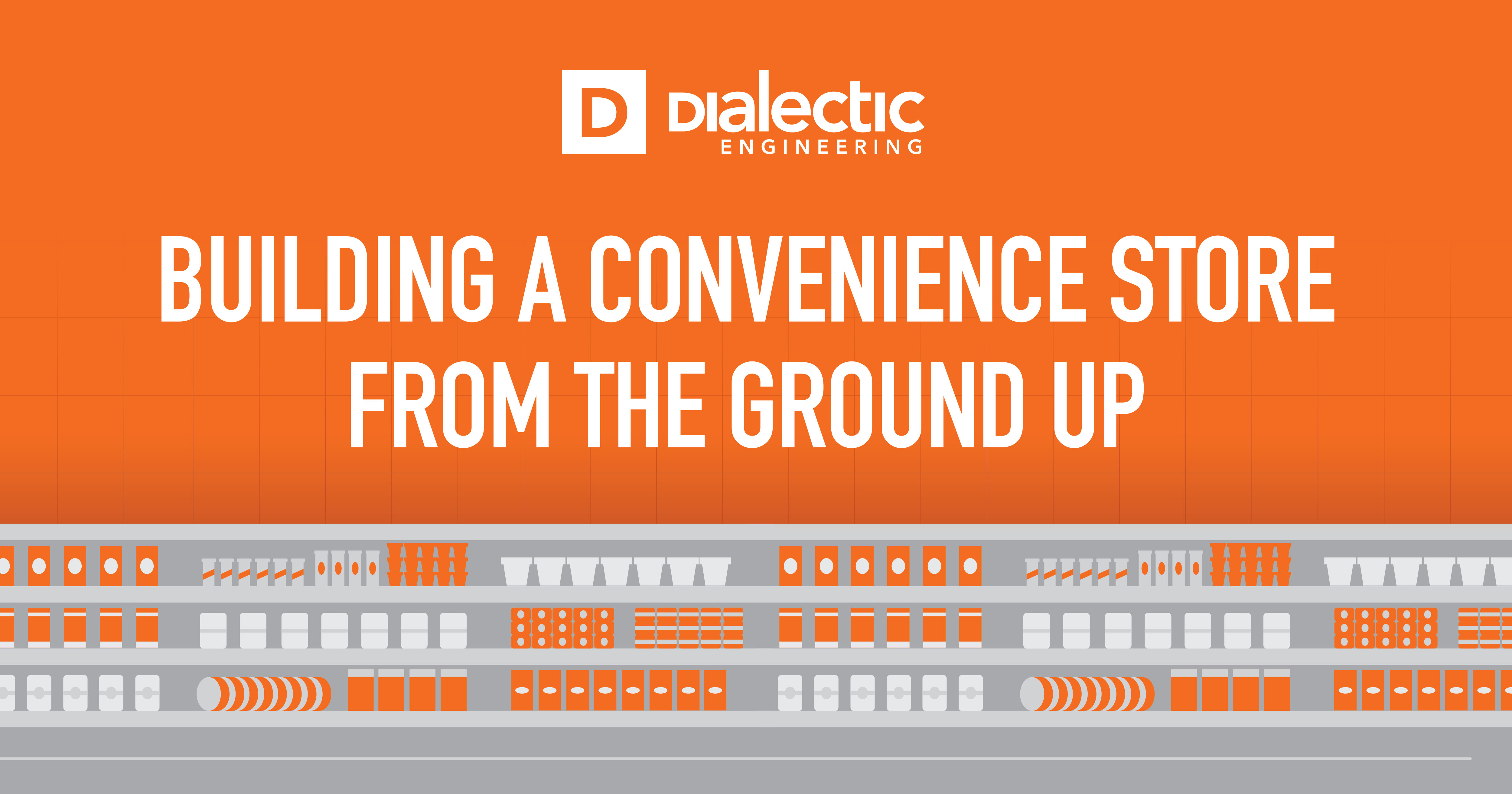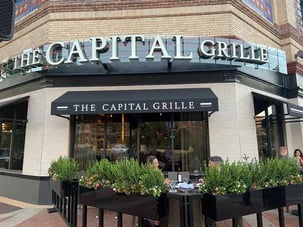4 min read
Building a Convenience Store From the Ground Up
Dialectic Engineering
Oct 16, 2023 12:28:11 PM

BUILDING A CONVENIENCE STORE FROM THE GROUND UP
From daily coffee pickup spots to snack superstores and road trip landmarks, convenience stores are some of the most essential retail stores in our communities. Because these C-stores are so commonly found in both urban and rural communities, they are always in competition to innovate and earn repeat customer business.
Today’s leading convenience stores are transforming the way they supply goods to customers. These stores have developed mechanical, electrical, and plumbing engineering solutions that are essential to the store’s success.
C-store owners need to understand cooling and refrigeration, energy efficiency, food and drink display engineering and plumbing, lighting design, and security to create a competitive convenience store design.
REFRIGERATION DESIGN AND ENGINEERING CONSIDERATIONS
Wall-to-wall refrigerators have become an essential feature of convenience stores to preserve their perishable products and provide customers with easy access.
Engineers specially design the refrigeration systems in convenience stores to be durable for regular public use, maintain optimal temperature and humidity levels, have easy access for maintenance, and be as energy efficient as possible.
Refrigeration Systems
To best preserve products, engineers consider heat transfer, thermal mass, and insulation materials when designing a convenience store refrigeration system. The systems run on a continuous cycle to maintain consistent temperature levels, reducing temperature fluctuations that can damage the products. The cooler's door is designed to provide easy access to the products while preventing warm air from entering, maintaining constant temperature levels.
Temperature Control
Temperature control is vital for coolers, and engineers design control systems that are easy for store employees to use. Digital temperature controllers and sensors accurately monitor and maintain temperature levels within the cooler. Easy-to-use temperature control ensures that store employees can make adjustments, if necessary, without requiring specialized skills.
Maintenance
Engineers design refrigeration systems to be easily accessible for maintenance and service to minimize disruptions to the daily operations of the store. Engineers place the compressor, condensing unit, fan, and evaporator in readily accessible locations so that technicians can perform routine maintenance and repairs quickly and easily.
Energy Efficiency
Large-scale coolers use a lot of energy, and the power bill can quickly get out of hand. Designing an energy-efficient refrigeration system is essential to lower the convenience store’s energy bills. At Dialectic Engineering, we are always looking for innovative ways to incorporate the latest energy-efficient technologies when designing the system to promote sustainability. Convenience store owners should partner with an MEP engineering team to design coolers that minimize the use of powerful fans and compressors to reduce energy consumption and ultimately lower operating costs.
Walk-In Coolers and Beer Caves
Similar to on-the-wall coolers, walk-in coolers, and beer caves should be designed in the same way with adequate insulation, easy-to-use temperature controls, accessible maintenance points, and energy-efficient systems. As walk-in coolers become more popular, MEP engineers will continue to design improved systems to support the growing need.
CONVENIENCE STORE CHECKOUT COUNTER ENGINEERING
Each sale takes place at the checkout counter. Because this space is so important for the business, it is essential that it has reliable power allocation that supports all the necessary point-of-sale technology, temperature control units for employee comfort, and essential security equipment.
Checkout Counter Power Supply
Point-of-sale equipment is essential to the success of a C-Store. MEP engineers design the building’s power systems to support computers, multiple monitors and plug-ins, cash registers, credit card readers, and ATM machines. These power systems are designed for maximum efficiency and redundancy in case of power outages, power surges, and single-point failures.
Sufficient and reliable power is critical for security and safety equipment. Cameras, monitors, and control units need access to 24/7 power to maintain surveillance and help protect employees, shoppers, and the store itself.
Checkout Counter Employee Comfort
Convenience store employees spend the majority of their time behind this counter. Because of this, it Is important for the area to be comfortable to keep employees healthy and focused. Engineers help achieve this through temperature control and lighting.
Specially designed HVAC building systems route temperature-controlled air to the checkout counter station, creating consistent temperatures for employee comfort, and lighting is designed to adequately light the C-Store reducing dark zones and eye strain.
COFFEE AND DRINK COUNTER ENGINEERING
Drink counters are some of the most used areas in convenience stores. Because they are so important to the store, these counters are designed for efficiency with plumbing and electrical engineering.
Plumbing and Electrical Needs
To have a successful drink counter, convenience store engineers need to consider water filtration, drainage, and water pressure as well as power availability and sufficient energy capacity to power the equipment during peak demand hours.
Our electrical and plumbing engineers design power systems to support large commercial drink machines and drainage systems to divert byproducts or spilled liquids away from customers. We work directly with project architects to incorporate these features seamlessly into the design of the convenience store.
CONVENIENCE STORE LIGHTING AND SIGNAGE
Lighting and signage play crucial roles in enhancing product visibility and attracting customers to convenience stores. Stores must be adequately lit with energy-efficient overhead lighting for customers to quickly and easily find the products they are looking for, and specially designed accent lighting can be used to draw attention to specific products or promotional displays. At Dialectic, we provide tailored lighting design in all 50 U.S. states. We design our lighting to be functional, safe, energy-efficient, and aesthetically pleasing.
CONVENIENCE STORE SECURITY
Safety is always a top priority when designing any retail store. Robust security systems ensure employee and customer safety and minimize the risk of theft and vandalism. Different levels of security may be needed based on local regulations and a thorough risk assessment of the store's location and potential threats.
Electrical engineers are essential in the coordination of data and power security equipment. Today’s C-Stores use CCTV cameras, audio annunciation devices, visible strobes, and shopper trackers to ensure the property and the occupants are safe at all times. These systems require coordination throughout the store, linking back to the checkout counter. Our MEP engineers work to create a seamless network of power and data for store owners to keep their property protected.
CHECKING OUT
Convenience stores around the country are evolving to better serve their customers with efficient design, new food offerings, electrical vehicle charging, elevated customer experiences, and enhanced security. If you are looking for an MEP engineering partner to help design your convenience store, contact us today to learn more about how our team fits in seamlessly with your project partners.

